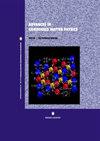Study of the Effect of Quenching on Microstructural and Magnetic Properties of Cu-Doped Mg-Ferrite
IF 1.8
4区 物理与天体物理
Q3 PHYSICS, CONDENSED MATTER
引用次数: 1
Abstract
Mg1-xCuxFe2O4 (x = 0.0–0.5) was prepared by the double sintering ceramic method, which sintered at 1100°C and 1200°C for 3 hours and investigated for structural, microstructural, and magnetic properties as a function of the Cu content and cooling process. XRD analysis of 1100°C sintered samples revealed that all the samples were crystallized in a single-phase cubic spinal structure. The microstructural and magnetic properties of slow cooled (furnace-cooled) and fast cooled (quenched) Mg-Cu ferrites have been studied using the scanning electron microscope (SEM), vibrating sample magnetometer (VSM), and Mössbauer spectroscopy after sintering at 1200°C. Homogeneous coaxial grains did not form for any furnace-cooled samples, while for the quenched sample, homogeneous grains were clearly visible even without doping with Cu. Substantial grain growth was witnessed by the samples with higher copper content for both cooling conditions, whereas quenched samples possessed a smaller grain size compared to furnace-cooled samples. The saturation magnetization experienced a higher value for quenched samples compared to furnace-cooled samples with increasing Cu content except for x = 0.4. The sextet pattern of Mössbauer spectroscopy confirmed all the samples were ferromagnetic in nature. Chemical shift, quadrupole shift, hyperfine field, and site occupancy of Fe3+ were also obtained using Mössbauer spectroscopy.淬火对cu掺杂mg -铁氧体组织和磁性能影响的研究
采用双烧结法制备了Mg1-xCuxFe2O4 (x = 0 ~ 0.5),分别在1100℃和1200℃下烧结3 h,研究了Cu含量和冷却工艺对Mg1-xCuxFe2O4组织、显微组织和磁性能的影响。1100℃烧结试样的XRD分析表明,所有试样均呈单相立方脊状结晶。采用扫描电镜(SEM)、振动样品磁强计(VSM)和Mössbauer谱仪研究了慢冷(炉冷)和快冷(淬火)Mg-Cu铁氧体在1200℃烧结后的显微组织和磁性能。炉内冷却后的样品均未形成均匀的同轴晶粒,而淬火后的样品即使不掺杂Cu,也能清晰地看到均匀的晶粒。在两种冷却条件下,具有较高铜含量的样品都有明显的晶粒生长,而淬火样品的晶粒尺寸比炉冷样品小。除x = 0.4外,随着Cu含量的增加,淬火样品的饱和磁化强度高于炉冷样品。Mössbauer光谱的六重模式证实了所有样品都是铁磁性的。利用Mössbauer光谱法还得到了Fe3+的化学位移、四极位移、超精细场和位占用。
本文章由计算机程序翻译,如有差异,请以英文原文为准。
求助全文
约1分钟内获得全文
求助全文
来源期刊

Advances in Condensed Matter Physics
PHYSICS, CONDENSED MATTER-
CiteScore
2.30
自引率
0.00%
发文量
33
审稿时长
6-12 weeks
期刊介绍:
Advances in Condensed Matter Physics publishes articles on the experimental and theoretical study of the physics of materials in solid, liquid, amorphous, and exotic states. Papers consider the quantum, classical, and statistical mechanics of materials; their structure, dynamics, and phase transitions; and their magnetic, electronic, thermal, and optical properties.
Submission of original research, and focused review articles, is welcomed from researchers from across the entire condensed matter physics community.
 求助内容:
求助内容: 应助结果提醒方式:
应助结果提醒方式:


